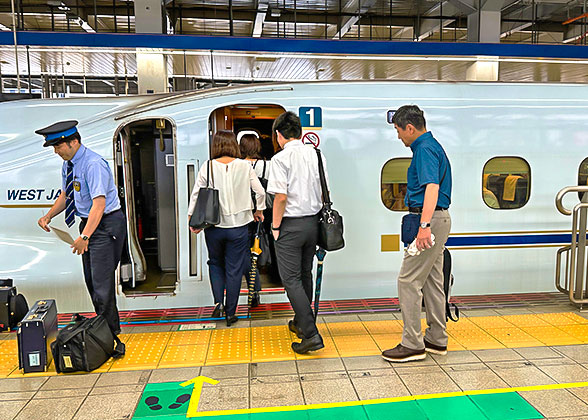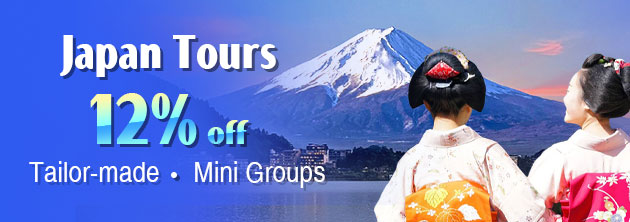Shinkansen, Japan Bullet Train
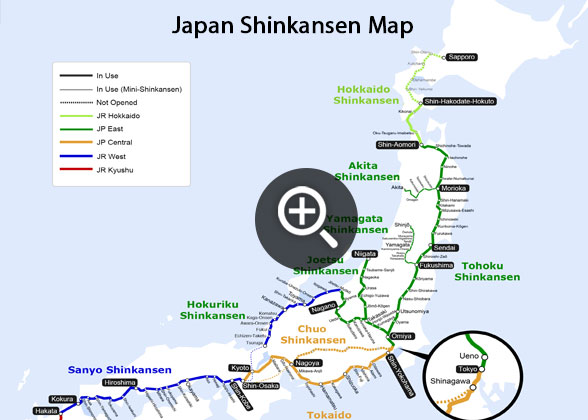
Map of Shinkansen, Japan
|
Shinkansen, meaning “new trunk line” in Japanese, is Japan’s high speed railway network. With the total distance of nearly 2,982 km (1,853 miles), it links many big cities in Japan such as Tokyo, Kyoto, Sendai, Osaka, Morioka, Fukushima, Karuizawa, Nagano and Toyama. The locomotive looks like a bullet, hence also called Bullet Train. Trains running along it are fast, punctual, stable, safe and have been the best way to travel around the country.
Three Types of Shinkansen Cars

Ordinary Car: Seats in an ordinary car are arranged in the model of 3 + 2 in each row with large foot space, thus generally, being comfortable. The price of ordinary seats is the lowest among the three.

Green Car: In green cars, larger foot space is offered as 2 + 2 seats are arranged in each row.

Gran Car: Only new trains running along Tohoku, Hokuriku and Hokkaido offer gran class seats for their passengers. The gran class seats are similar to business class seats in an airplane, coming in rows of 2 + 1 seats and leaving more foot and elbow space for passengers. Surely, they are the most expensive.
Seats Reservation
Generally speaking, Shinkansen trains offer both non-reserved seats and reserved seats.

Non-reserved seats: Most bullet trains have non-reserved carriages. The seats are first aboard, first got. There are always seats left on usual days. However, these carriages are likely to be crowed in peak seasons with no seats available.
 Reserved Seats: All passengers need to reserve a seat if going to take Hayabusa, Hayate and Komachi trains on the Tohoku and Hokkaido Shinkansen and Kagayaki trains on the Hokuriku Shinkansen. In green cars, all the seats require advanced reservation.
Reserved Seats: All passengers need to reserve a seat if going to take Hayabusa, Hayate and Komachi trains on the Tohoku and Hokkaido Shinkansen and Kagayaki trains on the Hokuriku Shinkansen. In green cars, all the seats require advanced reservation.
Read more about Seat Classes
Facilities of Japan Shinkansen
1. Luggage racks are above the seats on two sides of the cabin. In the area behind the last row of the seats, or in the linkage area of the two cabins, there is also space for putting luggage.
Note: Passengers travelling with the oversized luggage, whose overall dimensions (length + width + height) is over 160 cm, are required to reserve a seat with the oversized luggage area onto the Takaido, Sanyo, Kyushu and Nishi-Kyushu Shinkansens. Without the reservation, a luggage fee of JPY 1,000 will be charged. The seat with an oversized luggage area is usually in the last row.
2. Food carts with snacks, drinks, meals and Ekiben which is Japanese railway boxed meal made of local specialties are provided onboard.
3. Passengers can charge their electronic gadgets in the sockets installed below the window or in the last row.
4. Both western toilets and squat toilets are equipped onboard.
|
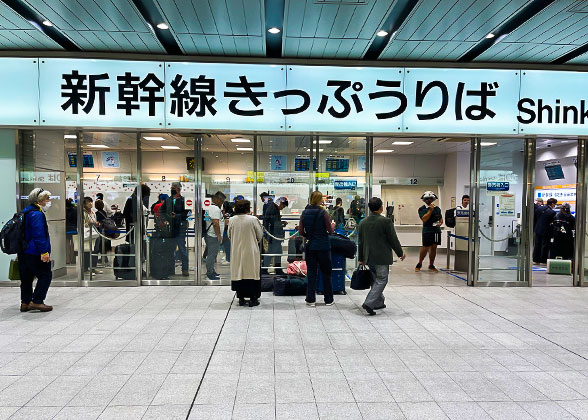
Shinkansen Train Station
|
|
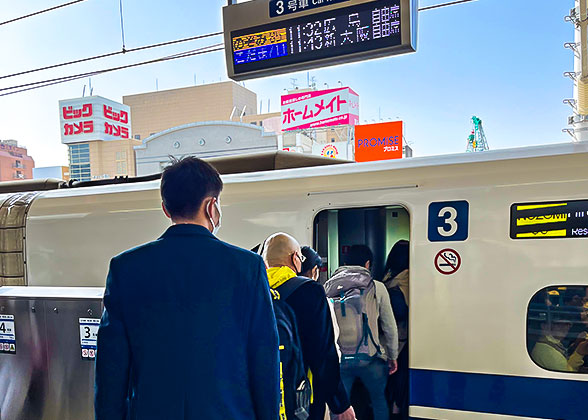
Boarding Shinkansen Train
|
|
10 Shinkansen High Speed Railways
Tokaido Shinkansen

Open date: October 1st, 1964

Distance: 515 kilometers (320 miles)

Top speed: 285 km/h (175 mph)

Trains in service: Nozomi, Hikari, Kodama; N700 series and N700S series

Route: Tokyo, Shinagawa, Shin-Yokohama, Odawara, Atami, Mishima, Shin-Fuji, Shizuoka, Kakegawa, Hamamatsu, Toyohashi, Mikawa-Anjo, Nagoya, Gifu-Hashima, Maibara, Kyoto and Shin-Osaka

Attractions passing by:
Tokyo Tower,
Meiji Jingu Shrine, Ueno Zoo,
Tokyo Disneyland,
Sensoji Temple, Minato Mirai 21, Hakone Yumoto Onsen,
Mount Fuji,
Nagoya Castle, LEGOLAND Japan
Tohoku Shinkansen

Open date: June 23th, 1982

Distance: 674.9 kilometers (419 miles)

Top speed: 320 km/h (199 mph)

Trains in service: Komachi, Hayabusa, Hayate, Yamabiko, Nasuno; E2 series, E3 series, E5 series, E6 series

Route: Tokyo, Ueno, Omiya, Oyama, Utsunomiya, Nasu-Shiobara, Shin-Shirakawa, Koriyama, Fukushima, Shiroishi-Zao, Sendai, Furukawa, Kurikoma-Kogen, Ichinoseki, Mizusawa-Esashi, Kitakami, Shin-Hanamaki, Morioka, Iwate-Numakunai, Ninohe, Hachinohe, Shichinohe-Towada and Shin-Aomori

Attractions passing by: Aomori Nebuta Matsuri, White Cloud Mountain, Temples and gardens in Hirakawa, Aomori and Hirosaki Park
Hokuriku Shinkansen
 Open date: October 1st, 1997
Open date: October 1st, 1997
 Distance: 454 kilometers (282 miles)
Distance: 454 kilometers (282 miles)

Top speed: 260 km/h (161 mph)

Trains in service: E7 series and W7 series

Route: Tokyo, Ueno, Omiya, Kumagaya, Honjo-Waseda, Takasaki, Annaka-Haruna, Karuizawa, Sakudaira, Ueda, Nagano, I’iyama, Joetsu-Myoko, Itoigawa, Kurobe-Unazukionsen, Toyama, Shin-Takaoka, Kanazawa, Komatsu, Kaga-Onsen, Awara-Onsen, Fukui, Echizen-Takefu, Tsuruga
Attractions passing by: Jigokudani Onsen, Zenkoji Temple, Matsumoto Castle.
Joetsu Shinkansen

Open date: November 15th, 1982

Distance: 269 kilometers (167 miles)

Top speed: 275 km/h (171 mph)

Trains in service: E7 series

Route: Tokyo, Ueno, Omiya, Kumagaya, Honjo-Waseda, Takasaki, Jomo-Kogen, Echigo-Yuzawa, Urasa, Nagaoka, Tsubame-Sanjo and Niigata

Attractions passing by: Tateyama Kurobe Alpine, Historic Villages of
Shirakawa-go and Gokayama and Stone Church, Sado Island
It is extended to Gala-Yuzawa from Echigo-Yuzawa during the ski season.
Hokkaido Shinkansen

Open date: March 26th, 2016

Distance: 149 kilometers (93 miles)

Top speed: 260 km/h (161 mph)

Trains in service: E5 series and H5 series

Route: Shin-Aomori, Okutsugaru-Imabetsu, Kikonai and Shin Hakodate Hokuto

Attractions passing by: Furano Ski Resort, Noboribetsu Marine Park Nixe, Otaru Canal Cruise and Hokkaido Shrine.
The section between Shin Hakodate Hokuto to Sapporo will be open around 2030.
Sanyo Shinkansen

Open date: March 15th, 1972

Distance: 554 kilometers (344 miles)

Top speed: 300 km/h (186 mph)

Trains in service: 500 series, 700 series and N700 series

Route: Shin-Osaka, Shin-Kobe, Nishi-Akashi, Himeji, Aioi, Okayama, Shin-Kurashiki, Fukuyama, Shin-Onomichi, Mihara, Higashi-Hiroshima, Hiroshima, Shin-Iwakuni, Tokuyama, Shin-Yamaguchi, Asa, Shin-Shimonoseki, Kokura and Hakata

Attractions passing by:
Himeji Castle,
Itsukushima Shrine, Iwami Ginzan Silver Mine, Tottori Sand Dunes and Korakuen Garden
Kyushu Shinkansen

Open date: March 13th, 2004

Distance: 257 kilometers (160 miles)

Top speed: 260 km/h (161 mph)

Trains in service: 800 series and N700 series

Route: Hakata, Shin-Tosu, Kurume, Chikugo-Funagoya, Shin-Omuta, Shin-Tamana, Kumamoto, Shin-Yatsushiro, Shin-Minamata, Izumi, Sendai and Kagoshima-Chuo

Attractions passing by: Kumamoto Castle, Mountain Hell Hot Springs, Mount Aso, Okinawa Churaumi Aquarium and Sengan-en Garden
Nishi-Kyushu Shinkansen

Open date: September 23th, 2022

Distance: 66 kilometers (41 miles)

Top speed: 260 km/h (161 mph)

Trains in service: N700S series

Route: Takeo-Onsen, Ureshino-Onsen, Shin-Omura, Isahaya and Nagasaki

Attractions passing by: Takeo Onsen, Ureshino Onsen, Glover Garden, Mt. Inasa, Oura Catholic Church
Akita Shinkansen

Open date: March 22, 1997

Distance: 127 kilometers (79 miles)

Top speed: 130 km/h (81 mph)

Trains in service: E6 series

Route: Morioka, Shizukuishi, Tazawako, Kakunodate, Omagari and Akita

Attractions passing by: Lake Tazawa, Dakigaeri Valley, Akita Museum of Art, Senshu Park, Hotel Grantia Akita Spa Resort, Godzilla Rock
Yamagata Shinkansen

Open date: July 1, 1992

Distance: 149 kilometers (93 miles)

Top speed: 130 km/h (81 mph)

Trains in service: E3-1000 series/ E3-2000 series

Route: Fukushima, Yonezawa, Takahata, Akayu, Kaminoyama-Onsen, Yamagata, Tendo, Sakurambo-Higashine, Mmurayama, Oishida and Shinjo

Attractions passing by: Yamagata Zao Onsen Ski Resort, Yamadera Temple, Dokkonuma Swamp, Hommaru Ichimonjimon and Jikakudaishi no Yasumi Ishi.
Read more about Types of Trains in Japan Is It Cheaper to Fly or Take the Train in Japan

![]() Reserved Seats: All passengers need to reserve a seat if going to take Hayabusa, Hayate and Komachi trains on the Tohoku and Hokkaido Shinkansen and Kagayaki trains on the Hokuriku Shinkansen. In green cars, all the seats require advanced reservation.
Reserved Seats: All passengers need to reserve a seat if going to take Hayabusa, Hayate and Komachi trains on the Tohoku and Hokkaido Shinkansen and Kagayaki trains on the Hokuriku Shinkansen. In green cars, all the seats require advanced reservation.
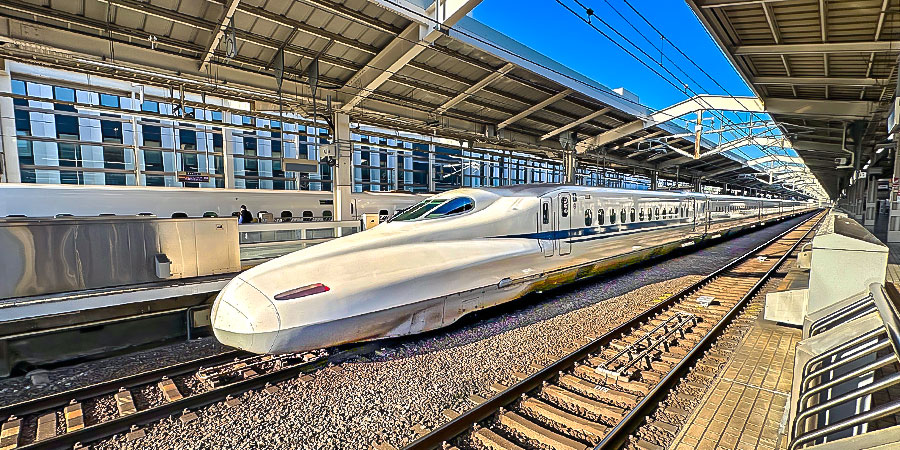
![]() Open date: October 1st, 1997
Open date: October 1st, 1997
![]() Distance: 454 kilometers (282 miles)
Distance: 454 kilometers (282 miles)
